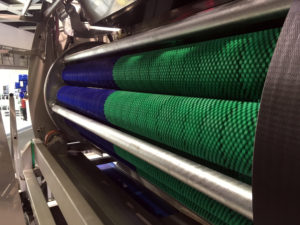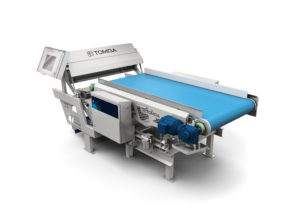Ways food producers are standing out
In today’s market economy, consumers and retailers place higher demands on you, the processor, that impact bottom lines. While it’s not always easy, one way to stay ahead of the competition is to find and use your differentiating factor.
The following companies provide great examples of how to set your company apart.
Vegetable polishing
Sometimes it’s the little things, like visual appeal, that set processors apart from their competition. John Rietveld, owner of Rietveld Equipment, sells processing equipment to Illinois-based processors and growers. One of the processing equipment manufacturers he works with is Allround Vegetable Processing, based out of The Netherlands.

One of his customers, Todd Nichols, owner of Nichols Farm & Orchard, purchased a washing, polishing and grading line from Allround Vegetable Processing a few years ago.
Allround’s polishers are commonly used by companies that want to give their produce a “premium” look and feel. The polisher consists of a rotating drum with counter-rotating brushes, which clean produce thoroughly, Rietveld explained. In addition, the polisher brushes away product irregularities and blemishes that would make the product less visually pleasing. Brush hardness is dependent on the type of vegetables being cleaned.
Rietveld said Nichols uses the polisher to clean up vegetables to make them more aesthetically pleasing to his customers. He said Nichols sells direct to consumers at a local market, and to restaurant owners who pay a premium for quality, locally produced vegetables.
Improving traceability and minimizing food waste
In recent years, blockchain has received a lot of buzz, and rightly so. It has the potential to improve relations between all parties along the sometimes-lengthy food supply chain, as well as better traceability and minimize food waste.
Blockchain is best described as a system that allows a group of participants, people or businesses to securely work together without relying on a third party. The technology stores data, which is synchronized using an algorithm, on multiple computers. The technology reduces the risk of mistakes and fraud, while improving traceability. Louis de Bruin, a blockchain thought leader for IBM’s Global Business Services in Europe, works closely working with the Linux Foundation’s Hyperledger Fabric effort, an open source technology used by IBM, to develop enterprise-grade blockchains.
“Blockchain solutions, like IBM Food Trust, benefit the entire food ecosystem, including fruit and vegetable processors and more, by providing authorized users with immediate access to actionable food supply chain data, from farm to store and ultimately the consumer,” De Bruin explained. “The complete history and current location of any individual food item, as well as accompanying information, such as certifications, test data and temperature data, are readily available in seconds once uploaded onto the blockchain.”
Having access to this type of data leads to safer food, longer shelf life, reduced waste, faster traceability and better access to shared information for all participants.
Acccording to De Bruin, there are more than 150 global and diverse members using IBM Food Trust to improve food safety and freshness, including Dole, Driscoll’s, Topco, Nestle, Wakefern, Golden State Foods, Smithfield and National Fisheries Institute. Food producers like Driscoll’s are exploring ways to get berries to shelves faster, for example, and using blockchain to figure out which varieties last longest. The result is a reduction in food waste, and speedier payment times.
“There are a number of modules that we’ve helped various participants build based on their specific needs,” De Bruin said. “This includes applications that focus on how much time produce spends in transit to ensure its freshness, digital certificates that ensure authenticity of food products and the ability to securely trace products in seconds to mitigate cross-contamination and the spread of foodborne illness.”
Corporate social responsibility goals
Bonduelle Fresh Americas (BFA) has published a corporate social responsibility strategy, which identifies goals that the company plants to target over the next five years. Bonduelle is a family-owned business that processes vegetables, producing quality products, including fresh vegetables, salads and meal solutions in its four processing plants across the U.S. BFA is one of the few vegetable processors that has a corporate social responsibility strategy of this caliber.
The company’s goals focus on water, energy, waste reduction, packaging, and food safety, among other things. BFA plans, for instance, to reduce water and cut energy intensity by 25% in all of its production plants. In terms of packaging, the company plans to transition to a packaging portfolio that is 100% recyclable, reusable or compostable.
“We are excited to launch this comprehensive strategy at Bonduelle Fresh Americas, covering issues ranging from water use and packaging to human rights and labor,” said Mathew Caldwell, senior manager of CSR for Bonduelle Fresh Americas. “We are prioritizing the right issues, committing ourselves to improving in these areas, and engaging all stakeholders in these actions — employees, customers, consumers, communities and suppliers.”
Bonduelle Fresh Americas offers a complete range of products featuring fresh produce and protein under the company’s Ready Pac Foods, Bistro, Ready Snax, Cool Cuts, elevĀte, Bonduelle Fresh Picked and Bonduelle Heat & Eat Harvest Bowl brands. They offer fresh-cut salads, fresh-cut vegetables, snacking and fresh prepared meals.
Optical sorter helps improve volume, quality
Earlier this year, as part of its ongoing objective to achieve “maximum output in both volume and quality,” global fresh-frozen vegetable processor Ardo installed two TOMRA Sentinel II optical sorting machines in its processing plant in Ardooie, Belgium.

A family-owned business, Ardo has grown to a €1-billion turnover through its commitment to quality. The company sources vegetables, herbs and fruit from 3,500 growers and processes 860,000 tonnes of produce annually. One-quarter of all frozen vegetables in Europe come from Ardo. They are used primarily in soups, ready-to-eat meals and baby food.
Ardo also supplies the house brands of almost all large European supermarkets, as well as large caterers for rest homes, hospitals and schools.
“As a very innovative company, investments in the factory are one way that we differ from our competitors,” said Ardo Group Sales Director Foodservice Heidi Goovaerts. “We also differentiate ourselves through sustainability. This includes minimizing food waste, which is one reason why we selected TOMRA’s sorting machines.
“TOMRA’s technologies will help us minimize waste and maximize productivity at the same time as delivering the highest product quality.”
Although it is most often used for tomato, peach and potato processing, the Sentinel II has a flexible design that makes it configurable for many different types of food sorting.
The latest illumination and detection technology ensures sorting accuracy, capacity, and durability. The Sentinel II is available in three different sizes. TOMRA says its throughput-to-width ratio is the highest in the industry.
“Ardo is one of the food industry’s great success stories, not least because of the company’s dedication to innovation and quality,” said Bjorn Thumas, vice president of business development and product management at TOMRA Food. “By investing in newer technology, Ardo is once again well-positioned to stay ahead of the game.”







